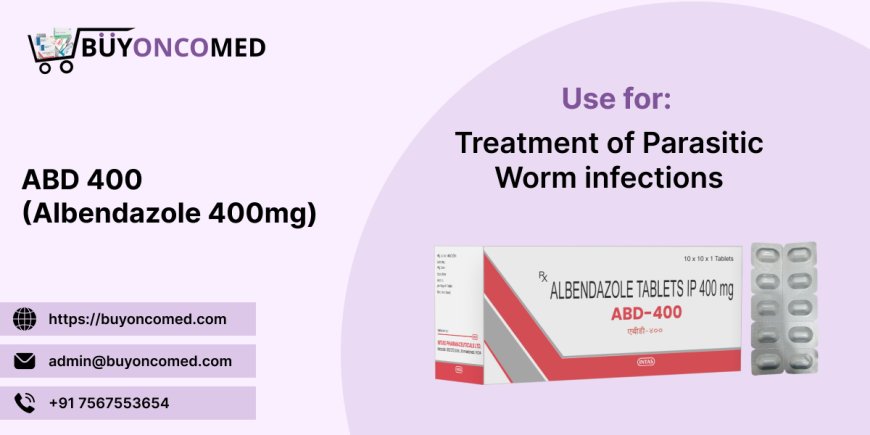Does albendazole treat all parasites?
Albendazole is one of the most commonly prescribed anthelmintic (anti-worm) medications globally, but no, it does not treat all parasites.

What is Albendazole?
Parasitic infections, how they work, and their limitations in this 2025 medical guide.
Albendazole is one of the most commonly prescribed anthelmintic (anti-worm) medications globally, but no, it does not treat all parasites. It is highly effective against many intestinal worms and some tissue parasites, but ineffective against most protozoa and blood-borne parasites.
Lets explore how this medication works, its strengths, and its limitations in detail.
Albendazole is a broad-spectrum anthelmintic drug first introduced in the 1970s. It belongs to the benzimidazole class of medications and is widely used for treating various helminthic infectionsparasites that are worm-like.
It is available under various brand names such as:
- Albenza
- Zentel
- Eskazole
How Does Albendazole Work?
Albendazole works by inhibiting the parasites ability to absorb glucose, which is essential for its survival. Without energy, the worms become paralyzed and eventually die.
This drug is metabolized in the liver into its active form, albendazole sulfoxide, and targets parasitic tissues effectively. However, its mechanism is mostly effective against multicellular parasites (helminths), not unicellular protozoa.
Types of Parasites Albendazole Can Treat
Intestinal Worms (Helminths)
Albendazole is excellent at treating most gastrointestinal worms, including:
- Roundworms (Ascaris lumbricoides)
- Hookworms (Ancylostoma duodenale, Necator americanus)
- Whipworms (Trichuris trichiura)
- Pinworms (Enterobius vermicularis)
Tapeworms (Cestodes)
Albendazole is highly effective against certain tapeworms, such as:
- Taenia saginata (beef tapeworm)
- Taenia solium (pork tapeworm)
- Echinococcus granulosus (hydatid cysts)
Tissue Parasites
Albendazole can cross tissue barriers and is used to treat:
- Neurocysticercosis (brain infection by pork tapeworm)
- Hydatid disease is caused by Echinococcus spp.
Albendazole and Protozoal Infections
Albendazole does not effectively treat protozoal infections, which are caused by single-celled organisms. For example:
- Giardia lamblia (giardiasis) better treated with metronidazole
- Entamoeba histolytica (amebiasis) requires tinidazole or metronidazole
Infections Albendazole Cannot Treat
Despite being broad-spectrum, albendazole is ineffective against:
Blood-borne Parasites
- Plasmodium spp. (Malaria)
- Trypanosoma spp. (Sleeping sickness)
- Leishmania spp. (Leishmaniasis)
Intracellular Protozoa
- Toxoplasma gondii (toxoplasmosis)
- Cryptosporidium spp.
These infections require different drugs like chloroquine, pentamidine, or nitazoxanide.
Albendazole Dosage and Administration
Standard dosage varies depending on the infection:
- Single dose (ABD 400 mg): Common for roundworm and hookworm
- Multiple doses (over several days to weeks): Used for hydatid disease or neurocysticercosis
Albendazole is usually taken with food, preferably a fatty meal to enhance absorption.
Side Effects
Most people tolerate albendazole well, but side effects may include:
- Nausea
- Abdominal pain
- Dizziness
- Liver enzyme elevation (in long-term use)
Routine liver tests are recommended for prolonged treatments.
Resistance to Albendazole
Resistance is a growing concern, especially in areas with frequent mass deworming. Some strains of hookworms and whipworms have shown reduced sensitivity to the drug.
When Not to Use Albendazole
Avoid or use cautiously in:
- Pregnant women (especially in 1st trimester)
- Liver disease patients
- Children under 2 years (unless prescribed by a doctor)
Prescription Guidelines Worldwide
- WHO recommends albendazole for global deworming campaigns.
- In the U.S., it is a prescription-only medication.
- Some countries use it in combination with ivermectin for community treatments.
Natural Alternatives to Albendazole
Though some herbal remedies like wormwood, pumpkin seeds, and clove are promoted online, their scientific evidence is limited and not a substitute for prescription treatment.
Doctors recommend albendazole only for specific parasitic infections. If youre unsure about your symptoms or diagnosis, always consult a healthcare provider before taking antiparasitic medications.
FAQs
Q1: Can albendazole cure malaria?
No. Malaria is caused by protozoa and requires antimalarial drugs like artemisinin.
Q2: Is albendazole effective against Giardia?
Not reliably. Metronidazole is preferred.
Q3: How quickly does albendazole work?
You may see improvement in 13 days for intestinal worms.
Q4: Can I take albendazole as a precaution?
Only if prescribed during mass deworming or if diagnosed with a parasitic infection.
Q5: Does albendazole treat scabies?
No, scabies requires topical treatment or ivermectin.
Q6: Can I take albendazole while pregnant?
Avoid in the first trimester; consult your doctor for guidance.
Conclusion
While albendazole is a powerful weapon against many intestinal and tissue parasites, it does not treat all parasites, especially protozoa and blood-borne infections. Knowing its limitations is key to choosing the right treatment.
For any suspected parasitic infection, always seek medical advice to ensure youre using the right medication for the right parasite.
For more information visit Buyoncomed.


































